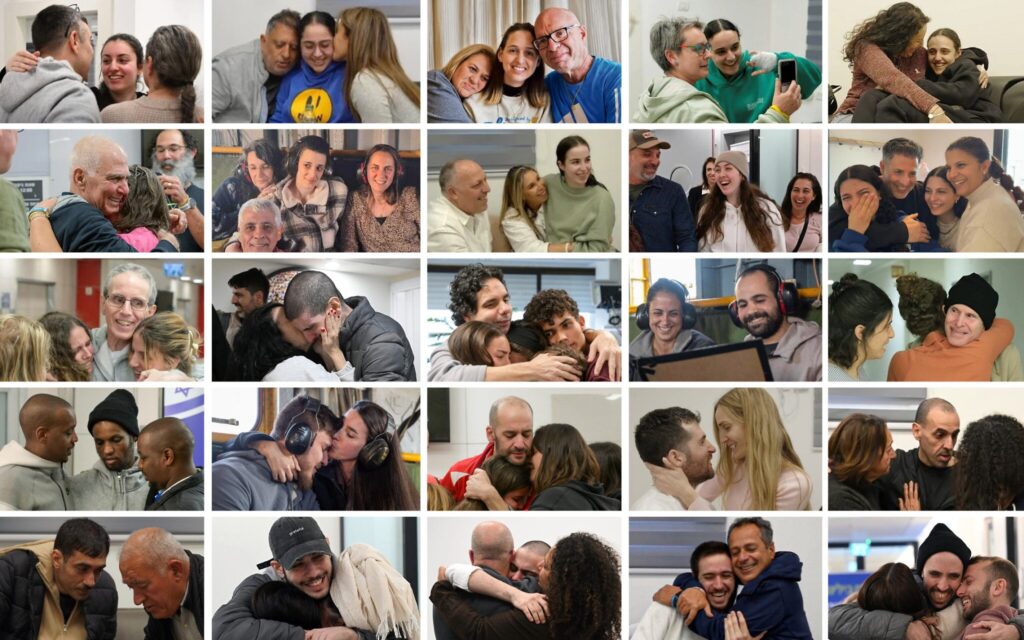The Hostages Are Coming Home
As I write this on Thursday morning, it appears that the hostage exchange will at least begin before Monday evening, the commencement of the Shemini Atzeret / Simchat Torah holiday. It is hoped that all the living hostages will have been returned by then in a single wave. The bodies of the deceased hostages are slated to follow, and we pray they are all released promptly.
This is the most joyful news since this terrible ordeal began on Simchat Torah two years ago. It is horrific that the hostages suffered for so long. The fortunate ones who were released earlier can well relate to what these remaining hostages have, are, and will experience. It is why they advocate so strongly for their release.
This news has been met with tumultuous joy in Israel. Everyone is thrilled that the hostages are coming home. There is dancing on the street, gratitude prayers among the families, and general rejoicing everywhere. Everyone is filled with hope, but also caution, since Hamas has complicated many previous deals in ways that prolonged the suffering or changed the protocols.
I want to offer several thoughts from Judaism on this subject. I do not intend these as halachic pronouncements on how the Peace Plan should be implemented, but rather as food for thought. I will focus on three points. (A) Freeing the hostages, (B) the prisoner exchange, and (C) the future of Gaza.
Freeing the Hostages
There is no greater form of charity in the Jewish ethos than liberating captives. The Talmud (Baba Batra 8b) calls it a Mitzvah Rabah, a great Mitzvah. Every Mitzvah engages a particular faculty of the Jewish soul and integrates it with G-d. Great Kabbalists can give you a precise breakdown of which Mitzvah activates which part of the soul. Regularly available texts only provide general examples.
Yet, in a powerful text, Rabbi Yosef Chaim of Baghdad (Ben Yehoyada Ad Loc.), a renowned Talmudic thinker and mystic, insisted that freeing hostages activates every aspect of the Jewish soul. He explained it like this. The Midrash famously breaks down the soul’s faculties into five general categories. The Hebrew word for five is chamesh. The numeric value of the word chamesh is the same as that of the phrase mitzvah rabah, with which the Talmud categorizes freeing hostages. This, says Rabbi Yosef Chaim, indicates that freeing hostages activates every part of the soul and integrates us wholly with G-d.
Gimatriya, the shared numeric values of words, does not create links between concepts. One can’t claim a link just because the numerical values line up. It works the other way. Only after one knows that two concepts are linked can one find significance in their shared numeric value. If Rabbi Yosef Chaim tells us that this great Mitzvah engages all five levels of the soul, he must have known it from his own tradition. That he found a numerical link between them only reinforced what he already knew to be true.
It can be said openly and without reservation that the Israeli government is engaging in a great Mitzvah that integrates the entire Jewish soul (and perhaps the collective Jewish soul) with G-d. When a single Jew is liberated, the whole nation is liberated because we are like one person with one collective soul. This is precisely why Israel is prepared to pay such high prices for hostages, and it is why Israel is in a state of transcendental joy in anticipation.
The Prisoner Exchange
This is also the heart of the problem. The terrorists know that all Jews are broken-hearted over the captivity of every single Jew. They know that Jews can be held over a barrel and forced to hand over thousands of prisoners for even one hostage, as evidenced by the deal to release Gilad Shalit.
The Talmud (Gitin 4:6) famously places two restrictions on our efforts to release hostages. While we may pay a ransom, we may not attempt to break them out of captivity, nor may we pay a ransom that exceeds their monetary value. The reason: If we work to spring the captives, the captors may take it out on other captives or make their conditions more restrictive to prevent their escape. If we overpay for the release of a captive, we incentivize the captors to capture more innocents.
The Talmud discusses the first clause in more detail and determines that it is only problematic if there is more than one captive and efforts are made to release only one captive at a time. This raises questions about using military pressure to release the hostages. Is it permissible so long as we liberate all the hostages in a given location, or is it forbidden because the enemy holds other hostages in other locations? This is food for thought that I can’t and won’t attempt to resolve.[1]
However, the other directive has more clarity. Overpaying for a ransom is forbidden because it incentivizes the enemy to take more captives. We have seen this play out in the recent past as Hamas made efforts to capture more hostages. Thank G-d these efforts failed, but every Jew is at risk because Hamas knows how many terrorists they can liberate by capturing a single Jew.
We need to change this equation. We need to return to the Talmudic standard of a fair exchange. Of course, we value one of our own more than a thousand terrorists, but paying excessive ransoms imperils other Jews. If terrorists knew that Jews don’t give more than one terrorist per hostage, there would be less incentive to take more hostages. Jews in Israel and around the world would be safer.
This is especially true if the prisoners we release return to terror operations, as many have. Not only does their release incentivize more hostage taking, but it also creates more terror that takes lives. This is an impossible situation. It is why Israel rejoices today but also grieves. The voices of opposition have already been raised. And they have a valid point.
The Future of Gaza
For all these reasons, and more, it is imperative that the deal not end with the prisoner exchange. The other facets of the peace plan must also be implemented. Hamas must be dismantled. The equation must change. The educational system in Palestinian areas must cease brainwashing children against Jews. If this doesn’t happen, the cycle will only start over again.
As of now, these follow-up points of the peace plan have yet to be agreed upon. Even once agreed upon, implementation will be a nightmare. How do you fight a mindset? You can fight an enemy combatant, but how do you change a pervasive culture that has been raised to hate for generations?
In summation, celebrating the two-year yahrzeit of those brutally murdered on October 7th / Simchat Torah by returning our hostages after two gruesome years of suffering, is a high point. It will be a cause for celebration, and we will dance for joy. However, Judaism cautions us against treating this like an endgame. Much work must still be done.
Perhaps the heavy lifting can finally begin. And let us hope that the healing process can also finally begin.
[1] I will mention that the war to dismantle the hostage taking force is not just permissible but an imperative in Jewish law. The concern for the hostages does not override it. It is driven by the need to erase the threat to more Jews. It is an obligatory war and amplified by the rubric, if one seeks to kill you, you must kill him first (Sanhedrin 72a).


























